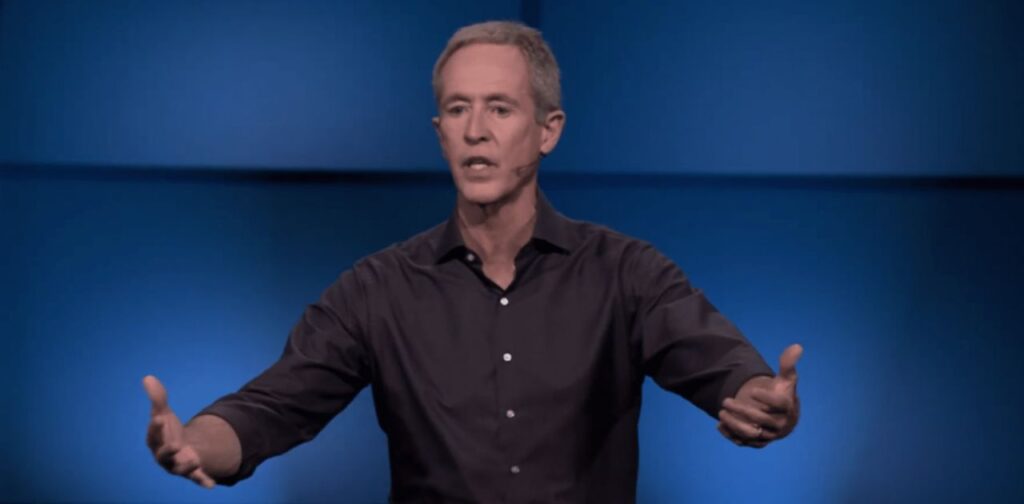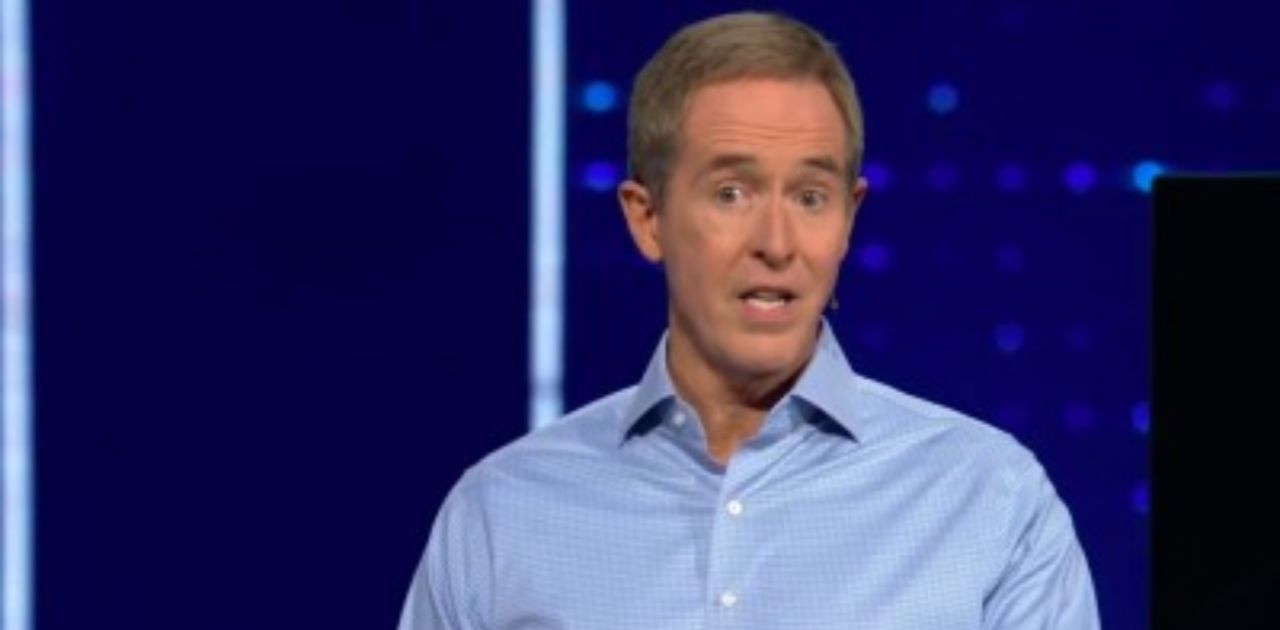The recent resignation of Andy Stanley, the head pastor of North Point Community Church, has ignited a significant controversy that has deeply affected both the congregation and the broader religious community.
Sparked by a sermon addressing the church’s stance on homosexuality and the balance between kindness and truth in Christian teachings, Stanley’s departure has led to heated debates on social media and within the church about faith, morality, and inclusivity.
As North Point Community Church navigates this tumultuous period, questions about its future direction, leadership, and core values have come to the forefront, challenging the congregation to reassess its beliefs in an evolving cultural landscape.
Background
The controversy surrounding Andy Stanley’s resignation from North Point Community Church began after a sermon he delivered on April 15, titled “When Gracie Met Truthy.” The sermon sparked a significant debate both within the church and the broader Christian community. North Point Community Church, founded by Stanley in 1995 in Alpharetta, Georgia, quickly grew into one of the largest and most influential megachurches in the United States, known for its innovative approaches to ministry and outreach. Stanley, the son of the renowned preacher Charles Stanley, has been a leading voice in modern evangelical circles, advocating for a more inclusive approach to Christianity while balancing traditional biblical teachings.
In his sermon, Stanley addressed the tension between kindness and truth in Jesus’ teachings, particularly regarding how the church should engage with individuals from the LGBTQ+ community. Using the narrative of a divorced couple as an illustration, Stanley hinted at a more accepting stance on homosexuality within the church. This position, however, struck a nerve with many within the congregation and beyond, igniting a firestorm of debate on the church’s approach to sin, inclusion, and biblical interpretation.
Sermon Content and Debate
Stanley’s sermon, “When Gracie Met Truthy,” quickly became a flashpoint for controversy. He suggested that the church should embody both grace and truth in its interactions with all individuals, regardless of their sexual orientation. Stanley’s message emphasized understanding, compassion, and kindness, aligning with his broader philosophy that the church should be a welcoming place for everyone. However, his remarks were perceived by some as a departure from traditional biblical teachings, particularly concerning the interpretation of homosexuality as a sin.
The sermon centered on a story of a divorced couple who attended North Point. Stanley used their story to explore the complexities of grace and truth, emphasizing that Jesus often met people where they were, offering love and compassion before addressing sin. For many, this approach resonated as a much-needed shift towards inclusivity and empathy. For others, it appeared to signal a weakening of the church’s commitment to biblical doctrine.
The reaction to Stanley’s sermon was swift and divided. Many church members appreciated his emphasis on grace and the church’s role in fostering a loving community. They argued that this was in line with the teachings of Jesus, who reached out to those marginalized by society. However, a substantial faction within the church and the wider evangelical community felt that Stanley’s message compromised the clear biblical teachings on sin and repentance. This group argued that while grace is vital, truth must not be sacrificed, especially concerning moral and doctrinal issues.
Response from Mohler and Others
The controversy escalated when R. Albert Mohler Jr., President of the Southern Baptist Theological Seminary and a prominent figure in conservative evangelical circles, publicly criticized Stanley’s sermon. On May 1, Mohler published a blog post dissecting Stanley’s remarks, arguing that they represented a dangerous shift away from traditional biblical teachings. He accused Stanley of attempting to normalize homosexuality within the church and called for a firm reaffirmation of biblical standards of morality.
Mohler’s response amplified the controversy, drawing attention from various Christian leaders, bloggers, and theologians. His critique resonated with many who were concerned that Stanley’s approach was indicative of a broader trend within some evangelical circles to downplay sin to appeal to a more secular audience. Mohler emphasized the importance of biblical fidelity and the need for the church to maintain its stance on issues of morality and repentance. He argued that any move toward normalizing behaviors traditionally seen as sinful within the Bible could lead to a slippery slope, eroding the church’s moral authority and compromising its mission.
Following Mohler’s critique, other religious leaders and commentators weighed in, some supporting Stanley’s approach as a necessary adaptation to the contemporary social landscape, while others echoed Mohler’s concerns about doctrinal drift. This public debate highlighted the deep divisions within American Christianity over how to engage with modern cultural issues, especially concerning sexuality, inclusion, and biblical authority.
Stanley’s Response and Controversy Escalation

In the face of mounting criticism, Stanley defended his sermon, emphasizing that his message was being misinterpreted and taken out of context. He clarified that his intent was not to normalize homosexuality but to encourage a posture of love and understanding toward all individuals, regardless of their background or lifestyle. Stanley argued that the church must navigate the tension between grace and truth and that his sermon was an attempt to explore this balance thoughtfully.
However, Stanley’s refusal to explicitly address the concerns raised by Mohler and others only intensified the controversy. His detractors argued that his theological stance was ambiguous and lacked the doctrinal clarity expected of a church leader. Many felt that his approach was more focused on appealing to broader cultural sensibilities than adhering to the strict tenets of biblical teaching.
As the controversy grew, the internal dynamics within North Point Community Church began to shift. Some members openly supported Stanley, praising his willingness to tackle difficult issues and push for a more inclusive church environment. Others, however, felt increasingly uncomfortable with what they perceived as a move away from the church’s biblical foundation. The lack of clear resolution led to growing tensions within the congregation, with rumors circulating about Stanley’s future and the direction of the church.
Resignation Announcement
On March 16, 2024, amid ongoing controversy and scrutiny, Andy Stanley announced his resignation as senior pastor of North Point Community Church. His resignation marked the end of an era for the church, which had been shaped significantly by his vision and leadership. Stanley’s decision to step down was met with mixed reactions; some expressed deep disappointment and sadness, while others viewed it as a necessary step for the church to return to its foundational principles.
Stanley’s resignation was seen by many as a response to the relentless criticism and pressure from within the church and the broader evangelical community. In his resignation announcement, Stanley emphasized that he made the decision after much prayer and reflection, recognizing that the ongoing debate was causing division within the church. He expressed his hope that his departure would allow North Point to refocus on its mission and values and continue to grow in its service to the community.
The resignation also prompted widespread discussion about the future of North Point Community Church and its direction post-Stanley. Many church members and observers were left wondering how the church would navigate this transition and what changes, if any, would be made to its approach to controversial social issues.
Future of North Point Community Church
With Stanley’s departure, North Point Community Church faces a critical juncture. The church must now decide how to move forward without the leader who has been at its helm since its inception. This period of transition presents both challenges and opportunities for the church to reassess its mission, values, and approach to ministry.
One of the immediate challenges for North Point will be to address the divisions that have surfaced within the congregation. The controversy over Stanley’s views has left some members feeling confused or even betrayed, while others remain steadfast in their support of his message. The church’s leadership will need to find a way to heal these divides and bring the congregation together.
At the same time, Stanley’s resignation provides an opportunity for the church to reflect on its values and consider whether a new direction is needed. The leadership may decide to reaffirm its commitment to traditional biblical teachings or perhaps embrace a more progressive approach that aligns with Stanley’s vision of inclusivity and grace. Whatever path the church chooses, it will need to communicate its vision clearly to ensure unity and continuity among its members.
Impact on Congregation Dynamics
The impact of Stanley’s resignation on the congregation’s dynamics cannot be overstated. His departure has left a leadership vacuum and created an atmosphere of uncertainty. Many congregants may feel disoriented, especially those who closely identified with Stanley’s vision and approach to ministry. His resignation has forced members to confront difficult questions about their faith and the church’s future direction.
Some members who supported Stanley’s inclusive approach may feel alienated or disillusioned by his resignation, questioning whether the church can continue to be a place of welcome and acceptance. Others, who disagreed with Stanley’s stance on homosexuality and biblical interpretation, may see his resignation as a positive step towards restoring what they perceive to be the church’s true mission.
The challenge for the church leadership will be to navigate these conflicting sentiments and foster a sense of community and purpose that transcends individual opinions and preferences. This will likely involve open dialogues, listening sessions, and efforts to rebuild trust and unity within the congregation.
Read Also: Tyler Stanaland Age: Discover How Old the Star Is Now
Leadership Transition Challenges
The transition to new leadership at North Point Community Church will be a delicate and complex process. Andy Stanley was not just the senior pastor but also the visionary leader who shaped the church’s culture, ethos, and ministry strategies. His departure leaves a significant gap that will need to be filled thoughtfully and strategically.
Selecting a new leader who can effectively guide the church through this period of change will be critical. The new pastor will need to address the unresolved issues left in the wake of Stanley’s resignation, including the church’s stance on homosexuality and its broader mission in a rapidly changing cultural context. Additionally, they will need to manage the congregation’s expectations and emotions, which may range from hope and optimism to anxiety and fear.
The transition process may also involve reevaluating the church’s organizational structure, leadership roles, and decision-making processes to ensure they align with the church’s values and goals. Ensuring a smooth transition will require clear communication, transparency, and a commitment to inclusivity and unity.
Reevaluation of Church Values
Stanley’s resignation has sparked a reevaluation of the values and principles that guide North Point Community Church. The controversy over his sermon and subsequent departure has forced the church to confront fundamental questions about its identity, mission, and stance on contentious social issues.
This period of introspection may lead to a more in-depth examination of the church’s theology and teachings, particularly concerning LGBTQ+ rights and inclusion. Some members and leaders may advocate for a return to more conservative, traditional interpretations of the Bible, while others may push for a more progressive approach that emphasizes grace, love, and acceptance.
Conclusion
In conclusion, Andy Stanley’s resignation from North Point Community Church marks a pivotal moment for the congregation and the broader religious community. The controversy surrounding his sermons and the subsequent debates on the church’s stance on homosexuality have exposed deep divisions and prompted a period of significant reflection. As the church navigates this transitional phase, it faces the challenge of unifying its members, redefining its values, and determining its future direction.
The impact of Stanley’s departure will be felt in the church’s leadership, outreach, and internal dynamics, making it crucial for the new leadership to address these issues thoughtfully. This period of change presents both challenges and opportunities for North Point Community Church to reaffirm its mission, adapt to evolving cultural contexts, and continue its commitment to serving its community while remaining true to its core principles.
Latest Article
Wdroyo Auto Insurance Guide – 2024
Uncategorized
Album:f7bc9yu1abs= Taylor Swift: Unveiling The Mystery
Uncategorized

Welcome to the heart of our website! The Admin Dashboard is your command center, where you can manage all aspects of the site effortlessly. Here, you’ll find intuitive tools for content management, user analytics, and system settings. Customize, control, and optimize your site experience with a few clicks. Whether you’re updating content, monitoring traffic, or fine-tuning user permissions, everything you need is right at your fingertips. Dive in and take charge!









